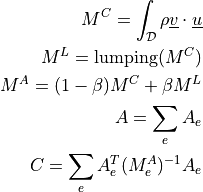sfepy.terms.terms_mass module¶
- class sfepy.terms.terms_mass.MassTerm(*args, **kwargs)[source]¶
Mass term with lumping and RMM support [1].
The lumping parameter can be ‘row_sum’, ‘hrz’ or ‘none’ (default). It applies for
 > 0:
> 0: = 0 correponds to the consistent mass matrix
= 0 correponds to the consistent mass matrix  ;
;0 <
 < 1 corresponds to the averaged mass matrix
< 1 corresponds to the averaged mass matrix
 .
. = 1 corresponds to the lumped mass matrix
= 1 corresponds to the lumped mass matrix  ;
;
term_mode can be None (default), ‘DPM’ (diagonal projection matrix
 ), or ‘RMM’ (reciprocal mass matrix
), or ‘RMM’ (reciprocal mass matrix  ).[1]
).[1]González, J.A., Kolman, R., Cho, S.S., Felippa, C.A., Park, K.C., 2018. Inverse mass matrix via the method of localized Lagrange multipliers. International Journal for Numerical Methods in Engineering 113, 277–295. https://doi.org/10.1002/nme.5613
- Definition:

- Call signature:
de_mass
(material_rho, material_lumping, material_beta, virtual, state)- Arguments:
material:

material: lumping
material:

virtual/parameter_1:

state/parameter_2:

- arg_shapes = {'material_beta': '.: 1', 'material_lumping': '.: str', 'material_rho': '1, 1', 'state': 'D', 'virtual': ('D', 'state')}¶
- arg_types = ('material_rho', 'material_lumping', 'material_beta', 'virtual', 'state')¶
- get_function(rho, lumping, beta, virtual, state, mode=None, term_mode=None, diff_var=None, **kwargs)[source]¶
- modes = ('weak', 'eval')¶
- name = 'de_mass'¶